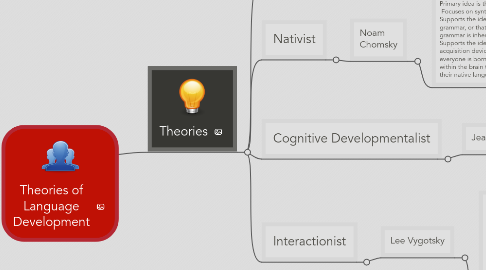
1. Theories
1.1. Behaviorist
1.1.1. B.F. Skinner
1.1.1.1. Behavior is key to language development. Children start out as blank slates. Reinforcement is important tool. Imitative speech is important as is repetition. Language development requires stimuli and responses.
1.2. Nativist
1.2.1. Noam Chomsky
1.2.1.1. Primary idea is that language is inborn. Focuses on syntactic knowledge. Supports the idea of universal grammar, or that the ability to learn grammar is inherent in children. Supports the idea of the language acquisition device, also an idea that everyone is born with mechanisms within the brain to construct speech in their native language.
1.3. Cognitive Developmentalist
1.3.1. Jean Piaget
1.3.1.1. Primary idea is that maturation allows for language development and that cognitive competencies set the pace. Supports idea that the sensorimotor stage must be reached before language can develop. Supports the importance of the preoperational stage in language development. Developmental stages must be considered because they are integral to language development.
1.4. Interactionist
1.4.1. Lee Vygotsky
1.4.1.1. Sociocultural interaction, communication with the world in which we live, is key to language development is primary idea. Zone of proximal development refers to the difference between language development capabilities of child alone and child with adequate mediation and assistance. Children learn language from each other. Language Acquisition Support System - environment supporting acquisition.
